
How to Have a Happy Divorce
The Happiest Divorce: 10 Rules For Creating a Thriving Family After a Breakup
When a marriage between two parents ends, the family remains. This “binuclear family” may live in two houses, but it’s still a family.
Constance Ahrons, a family therapist and professor emerita at the University of Southern California, coined the term “binuclear family” years ago, when the mainstream didn’t have a way to describe a divorced family with two parents. “It's probably one of the most popular forms of family in the US right now,” she told me, yet there was no way to describe it. Ahrons felt giving it a name would acknowledge the binuclear family’s status as legitimate.
Recognizing that a family still exists after parents split up might be the first step to having a successful divorce when children are involved. While almost any divorce comes with heartbreak and challenges, there are factors that can lead to a healthy — and perhaps happier — divorce for everyone involved. To figure out what those factors are, we talked to experts like Ahrons and surveyed more than 70 POPSUGAR readers whose parents divorced. Based on what we learned, this is how to have the happiest divorce you can.
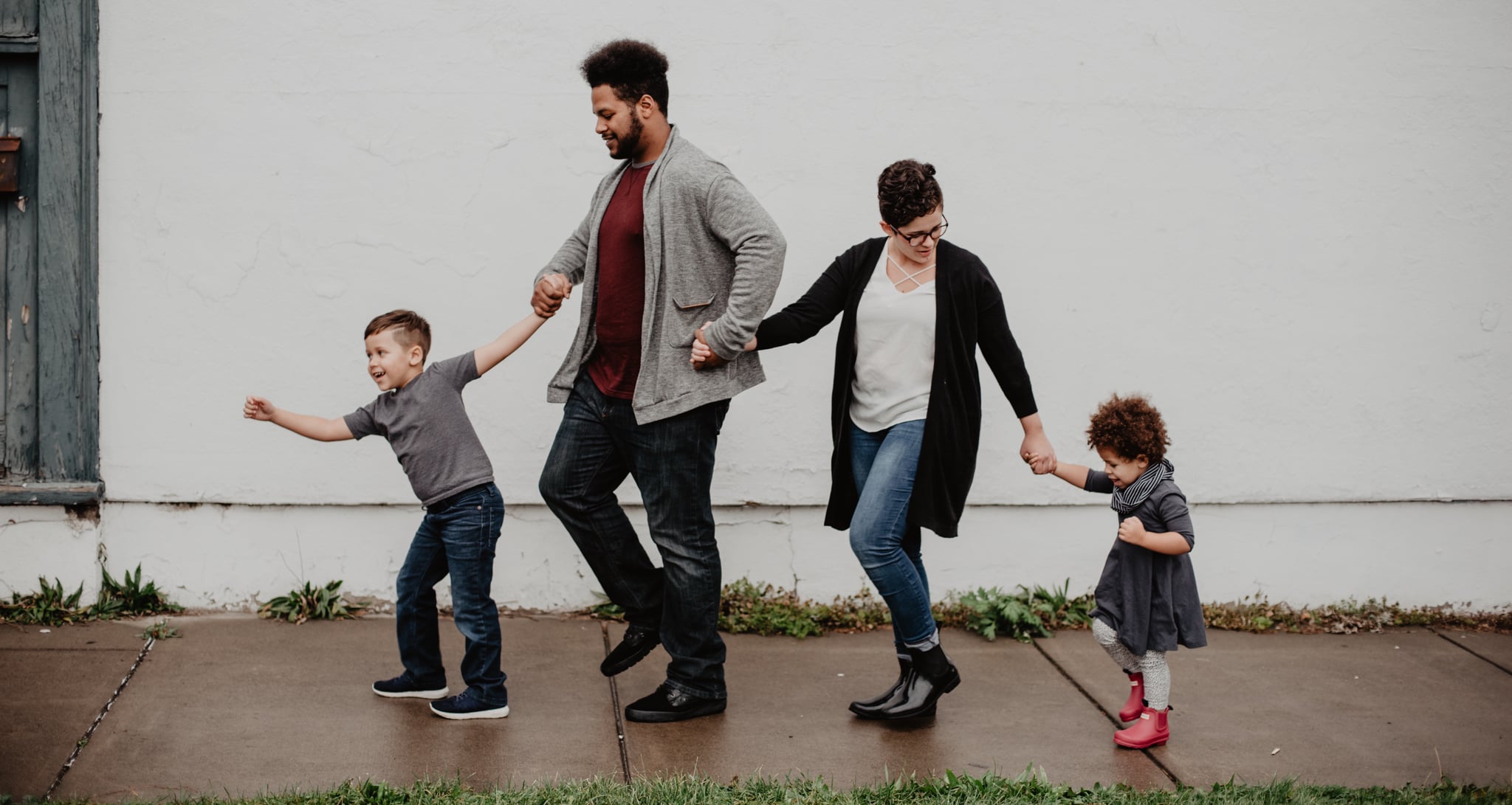
1. Do Compartmentalize the Spousal Issues from the Parental Issues
When you’re married with kids, you have two roles: spouse and parent. Both of these roles may bring up issues in the marriage, but it’s important to compartmentalize them when you’re separating. “The boundaries often aren't set very well. People will start talking about the kids and end up fighting about something in the marriage,” Ahrons said, adding that it takes hard work to avoid that. Ahrons recommends saying things like, “We’re talking about our kids right now,” to get things back on track.
Another side of compartmentalizing involves keeping your children shielded from your spousal issues. In our survey, we asked our audience: what do you wish your parents had done differently during the divorce? Many wished their parents hadn’t exposed them to the disagreements. A sample of the responses:
“There was a lot of arguing, and most of it was put on my shoulders.”
“I wish they would not have put us in the middle of it.”
“There were altercations, words were said that should not have been said by adults, and I was pulled in the middle and everyone wanted me to pick a side.”
“I was given very limited time with my father, and while in the process of the divorce I was constantly told why my father was a bad parent.”
A child shouldn’t have to provide emotional support for their parents. “No matter the age of the child, they have a right to not be involved in the disputes of their parents, to be used to carry information between parents about visitation schedules or other communication, or to hear their other parent badmouthed,” explained Diana M. Adams, a lawyer who has drawn up co-parenting agreements and helped families through collaborative divorces. When you’re going through a divorce, she stresses the importance of finding someone besides your kids to vent to about your ex.
Find someone besides your kids to vent to about your ex.
Of course it’s easier said than done. Suzanne Hayes has been through the challenges of divorce and co-parenting and struggled early on to get along with her ex, including in front of their kids. The mom of two wrote a piece for POPSUGAR, titled Yes, I'm Sitting Next to My Ex at Our Kid's Game — Here's Why, about how she managed to change that contentious relationship. In her essay, she describes having dinner with her ex and their kids twice a month and celebrating holidays together.
Curious how she got from painful arguments to friendly Sunday-night dinners, I asked her for her secrets. Ironically, Hayes simply had to remember why she was getting divorced in the first place. She and her ex-husband decided to divorce because they didn’t want their kids to see them argue and grow up in an unhappy home. Thus, continuing to argue in front of the kids would defeat the whole purpose. And, she said, it became easier to let things go when she reminded herself that they were no longer married: “What happens at his house on his watch in his business. I can't change him. He can't change me. But we can model a loving, kind co-parenting partnership for our children who are growing up way too fast in front of our eyes.”
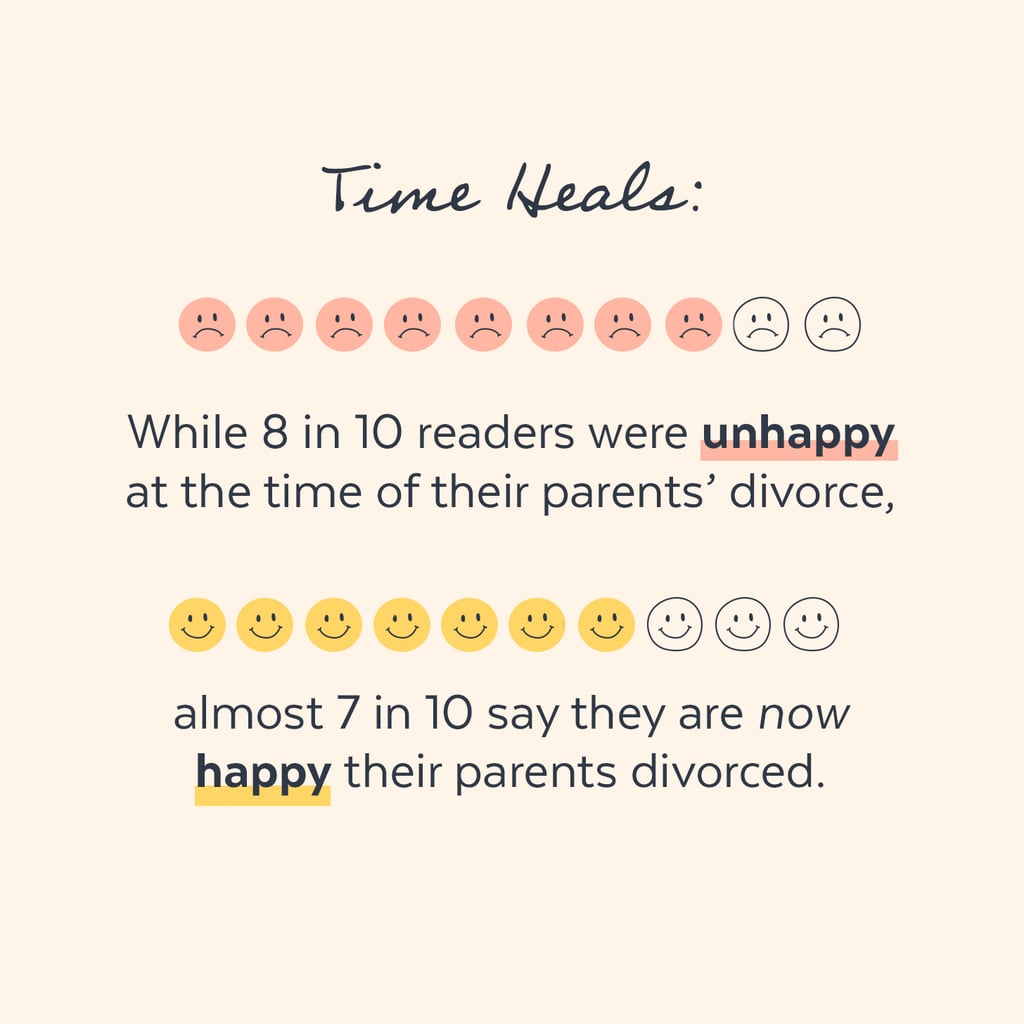
2. Do Create an Out-of-Court Co-Parenting Agreement
Having a commitment to keeping the spousal and parental issues separate is a great first step, but it doesn’t guarantee a former couple will have an easy time agreeing on co-parenting terms. That’s where experts like Ahrons and Adams can help. For her clients and patients, Ahrons has written 15 rules for a good divorce, and two of them involve outlining a co-parenting structure. They are:
- Make new rules for how to link your two households.
- Establish a limited partnership agreement.
In other words: agree on your terms and then make them binding. That may sound simple, but it also takes some imagination about the future. “When you're living together,” Ahrons told me, “you don’t have the same logistical parenting considerations. Not that you were always in sync. But in being divorced you have to think consciously about the details.”

The first question to answer: where will the kids be and when? Once you agree to a schedule, you can get to other details. “You want to cover preferences about eating, religion, bed times, and all the things that may be important in your life,” Ahrons said. This can also include topics like public or private school, lengths of vacations, and whether one parent can leave the country with the child. You’ll also need to discuss new relationships. “It's the subject that bogs people down,” Ahrons has found, but she said it’s important to lay out your rules for relationships in the agreement.
Adams, who has drafted legal documents for many couples, agrees: “During the divorce process, it’s useful to think ahead about future decision-making on major schooling or health decisions for the child, to get a general idea of shared intentions, and to consider how you’ll resolve any disputes without going back to court.”
Which brings up another important point: both Adams and Ahrons agree family court should be avoided if at all possible. “If you go to child custody court, you'll get a judge, who will spend five or 10 minutes with you and maybe never had a child development course, deciding,” Ahrons warned. “You’re better off being in control, even if you are angry. You can create an arrangement with attorneys who are committed not to go to court,” she explained.
“When mediations are done well, they teach the participants how to communicate.”
Adams is one such attorney and shared with me the extra benefits of mediation: “When mediation or collaborative practice are done well, they teach the participants how to communicate and allow time for practice with the support of professionals.” This can make it easier to co-parent in the future. “It’s the opposite experience of going through litigation,” Adams added.
When creating a legal co-parenting agreement, you should also be mindful of any issues presented by your specific situations. For example, when a same-sex couple splits up, often one former spouse is a biological parent, while the other is a non-biological parent. “It is absolutely critical that the non-biological parent get a second-parent adoption to secure their legal parenting rights,” Adams said. “Being on the birth certificate is not enough, as that may not be accepted in all places.” Adams said she’s seen an unfortunate trend with same-sex couples. After a bad breakup, the biological parent will move to a more conservative place where the other parent has no legal rights. Even when you want to avoid court, it’s important to engage experts who can help you navigate the legal ramifications of your situation.

3. Do Get Creative With Custody Arrangements
In our POPSUGAR survey, 61 percent of respondents said their parents did not share custody. And about the same number said their parents did not live near each other post-divorce. In addition, children whose parents did not share custody were more likely to be upset about their parents' divorce and are still less likely to be happy about the divorce today than readers whose parents did share custody. It appears that having both parents involved in the everyday lives of the children post-divorce can lead to a happier divorce. So what can these arrangements look like?
- One parental home as home base: “One custodial residence that is their primary residence and address for school district is the most common arrangement in New York and other states,” Adams told me. In this case, the other parent has the child(ren) on alternating weekends and perhaps for a dinner once a week.
- Nesting: In a nesting or bird nest arrangement, the kids stay in the same home while the parents take turns. When a parent isn’t in the family home, they stay either at their own place or at a second place they share with the other parent. Ahorns said she’s seen it work out for a couple years until one person re-couples or during a transitional phase. “It's difficult to share a home and perhaps a bed,” she said.
- 2-2-5: This involves one parent having every Monday and Tuesday, while the other has every Wednesday and Thursday. Then they alternate Friday, Saturday, and Sunday each week. The goal is that the children get to stay five days straight in one home. “With young kids I often hear parents say five days is too long to be away from my child,” Ahorns told me. So parents will try 2-2-5, but break it up by having one parent spend time with the kids during the day on the weekend.
- Upstairs/downstairs: Sometimes ex-spouses will live in the same home or apartment building, which allows the children to go from one home to the other without having to pack. “This only works if the co-parents can live near each other without conflict, jealousy, or nosiness as they move forward with their lives and may want to date others or have their own privacy,” Admas cautioned.
- 50/50: In this arrangement, the children spend one week with one parent and the next week with the other. “This can be difficult in practice, and the kids sometimes need more of a stable routine during their school weeks,” Adams said as a caveat.
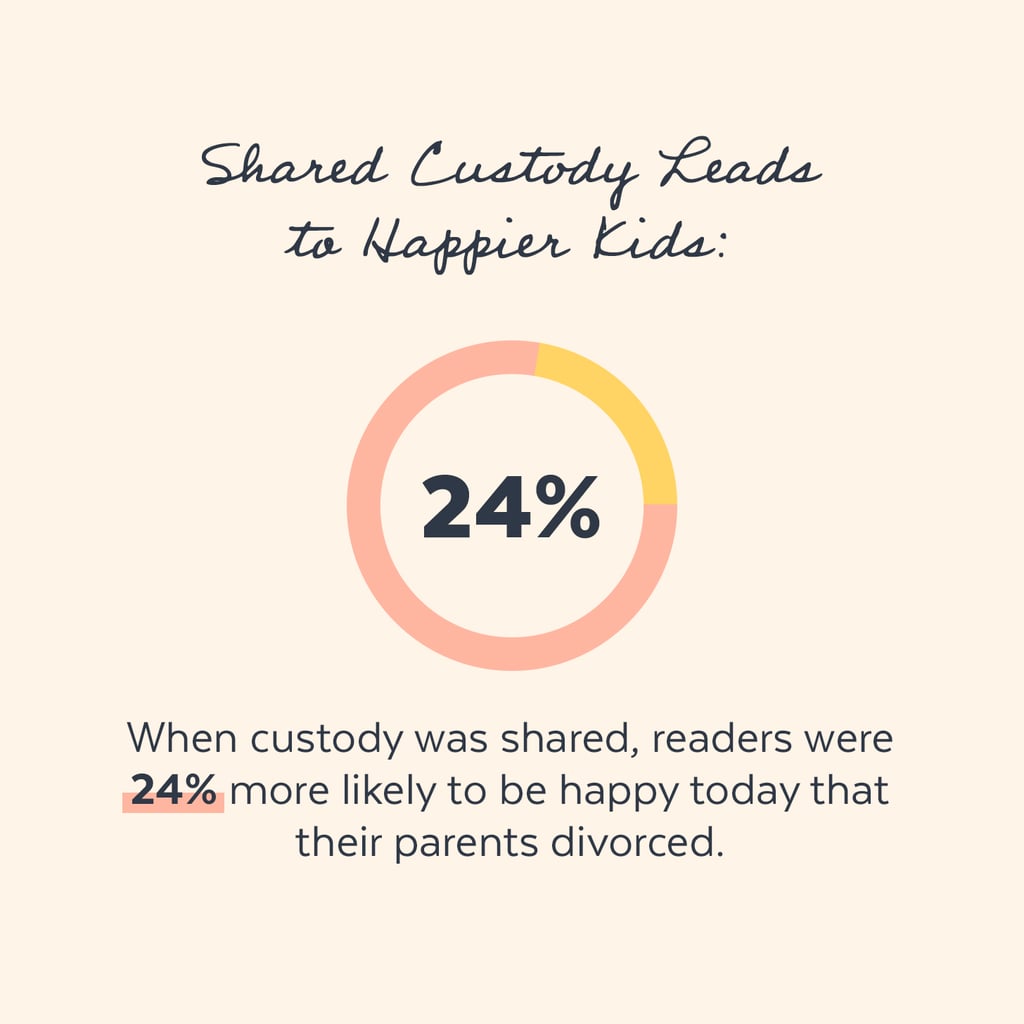
Although the grownups have to figure out what schedule works for their new lives, their co-parenting style can leave a lasting impression on the kids. In her POPSUGAR piece, The 1 Unexpected Relationship Lesson I Learned From My Parents' Divorce, writer Tess Chapin described how every Sunday she and her brother (and their pet hamster) would switch houses for the upcoming week. She wrote that because her father had to brush her hair, do the laundry, and cook dinner when they were in his house, the experience taught her that both mothers and fathers are capable of being supportive and responsible parents. “I've learned that parenting is firmly a joint effort that involves the participation and commitment of both parents in equal capacity, and I'm only seeking a partner who shares that view,” she said. Chapin plans to copy her parents’ child rearing style when she has kids — high praise for any parents, divorced or not.
I asked Chapin if she thought the 50/50 parenting split lead to a happier divorce for her parents, as well as the kids. “I’m not sure if a happy divorce exists, but it did make it smoother,” she said. “My parents also lived around the corner from each other when they first separated, a conscious decision on their part, which was good, as I wasn’t removed from the neighborhood I had spent my entire childhood in thus far.” Chapin said her parents were motivated by their love of their children. “At the end of the day, they knew that their personal feelings were secondary to the wellbeing of their children, which I really respect them for.”
The possibilities for custody arrangements are endless, and parents should consider what works best in their situations. The older and more mature the child, the more input they will have over their own visitation schedules, too. “Older kids should be able to express their own preference over whom they want to live with primarily and what kind of schedule they want without getting guilt from the other parent,” Ahorns said. This brings us to our next rule.
4. Do Consider the Needs of Your Child Based on Their Age
How else can parents make divorce easier on the kids? “Certainly being a baby helps,” Ahorns told me, half joking. She explained that up through being toddlers, kids won’t remember a time when their parents were together. “They can pretty well adjust,” she said.
Once you’re a bit older, it gets tougher. In our reader survey, respondents who were under 13 when their parents split were more likely to be upset at the time than those who were teenagers or young adults. If they are married today, younger children of divorce were also two-times more likely to have ever considered divorce themselves.

As you can imagine, teenage years also present unique challenges. “These years are hard because teenage kids are very focused on themselves. They tend to be highly narcissistic. Life is about me. So when parents come in and mess that up, kids are very angry,” Ahrons told me.
Ahrons also cautioned against assuming divorce is easy on adult children. “They will say, ‘I thought my parents got along. Was this all a farce? Was this something they were pretending?’ The divorce pulls the rug out from under them.” In general, she said it’s important to avoid divorcing during times of transition, like when a kid is going off to college.
While age can impact how a child experiences the divorce, when we asked readers how they felt about the divorce today, we saw similarities between younger and older children of divorce. More than two-thirds of both groups said they were happy today that their parents got divorced. Considering that, it seems that divorce is more upsetting to younger children in the moment, but with time both groups become similarly accepting of it.
5. Do Be Conservative About Introducing New Romantic Partners
Moving on to a new relationship is often an inevitability. Of the POPSUGAR readers we surveyed, 81 percent had at least one parent who got remarried and 44 percent of respondents said both of their parents got remarried. Between the original divorce and new marriage, a lot can happen, and it’s important for parents to use caution. Ahrons has this rule of thumb: wait six months to a year before you introduce a child to anybody. “You should be seeing this person and feeling like: we're going to live together, we're going to stay together.” Otherwise, it can cause harm to children to form attachments and then lose them quickly. When it comes time to introduce a new partner, be sure you have told your ex-spouse about your plans. “No surprises,” Ahorns said.

Adams agrees with Ahorns’ advice to take it slow, based on what she’s seen in her legal practice: “One great source of pain and instability for children of divorce is when they experience a revolving door of new boyfriends and girlfriends of their parents, who move in quickly and act like an instant step-parent, only to leave and break that bond.”
When we asked our readers how they felt about their parents’ romantic relationships post-divorce, there was a trend in the answers. The readers who had a positive relationship with their step-parents also noted earlier in the survey that their parents kept things amicable overall. Some sample responses:
My parents were and are very civil. I was very young (3) and don’t remember a lot from that time. In time both step-parents became very close and we have and had good relationships.
They remained civil and communicated well. They made it clear that it was not my fault. My dad remarried, and I like my stepmom and her two kids who were older than me. I never felt uncomfortable with them. I remain close with all of them.
They kept it amicable at all times even when I knew it was a war of the roses when we weren't home. They basically kept us out of the mix as much as possible. Those two are my bonus parents. We're family and look out for each other.
Based on these insights, it seems that parents who are generally respectful of their children’s needs, by keeping things amicable with their ex, will also win their children's approval and love for their new partners.
6. Do Handle the Aftermath of Affairs With Care
There are thoughtful ways to handle a new relationship so everyone is comfortable, but it’s far more challenging when a marriage ends because of an affair. As one reader told us in our survey, “I get along well with my mother’s husband, but not my father’s wife. He married the last mistress he had an affair on my mother with, and I hold that against her.”
A betrayal during the marriage won’t breed much trust after and also makes it hard to come together on parenting decisions. “I’ve done many tense collaborative divorces in which one spouse discovered an affair and left their spouse,” Adams said. “They may be experiencing raw rage, grief, and humiliation, and then they have to sit through a divorce and make decisions together about how to divide financial resources and make a visitation schedule.”
Adams acknowledged that this is very painful for the betrayed spouses, but she stressed that it’s still in a former couple’s best interest to use a collaborative divorce process, instead of enacting their rage and vengeance through litigation and, as she put it, “spending their life savings and causing each other more pain and trauma.”
7. Don’t Fight Every Time You See Each Other
As previously stated, it’s important to keep your spousal issues separate from parenting concerns while you process the divorce. But once you start co-parenting, there are many opportunities for potential conflict. “Fighting every time the kids go back and forth is upsetting for the kids,” Ahorns said. “They’ll go home and worry about the other parent.” She suggests avoiding interaction altogether if necessary, by having one parent drop off the kids at school and having another handle pick up, for example.
“Children don't need you to be best friends,” Ahorns assured me. “But they don't want to feel like they're in fear about what's going to happen next when you're together.” She also cautions against favoritism or trying to get a kid to talk badly about the other parent when they’re not around.
When we asked our readers what their divorced parents do well, many of them valued that their parents made an effort to get along, at least in the presence of the children:
“My mother always stayed positive and didn’t talk trash about my father to us kids.”
“My dad never once said anything bad about my mom to us.”
“They always made sure that I was not involved in their fights and that I just enjoyed my time with each of them.”
8. Don’t Sweep Issues Under the Rug
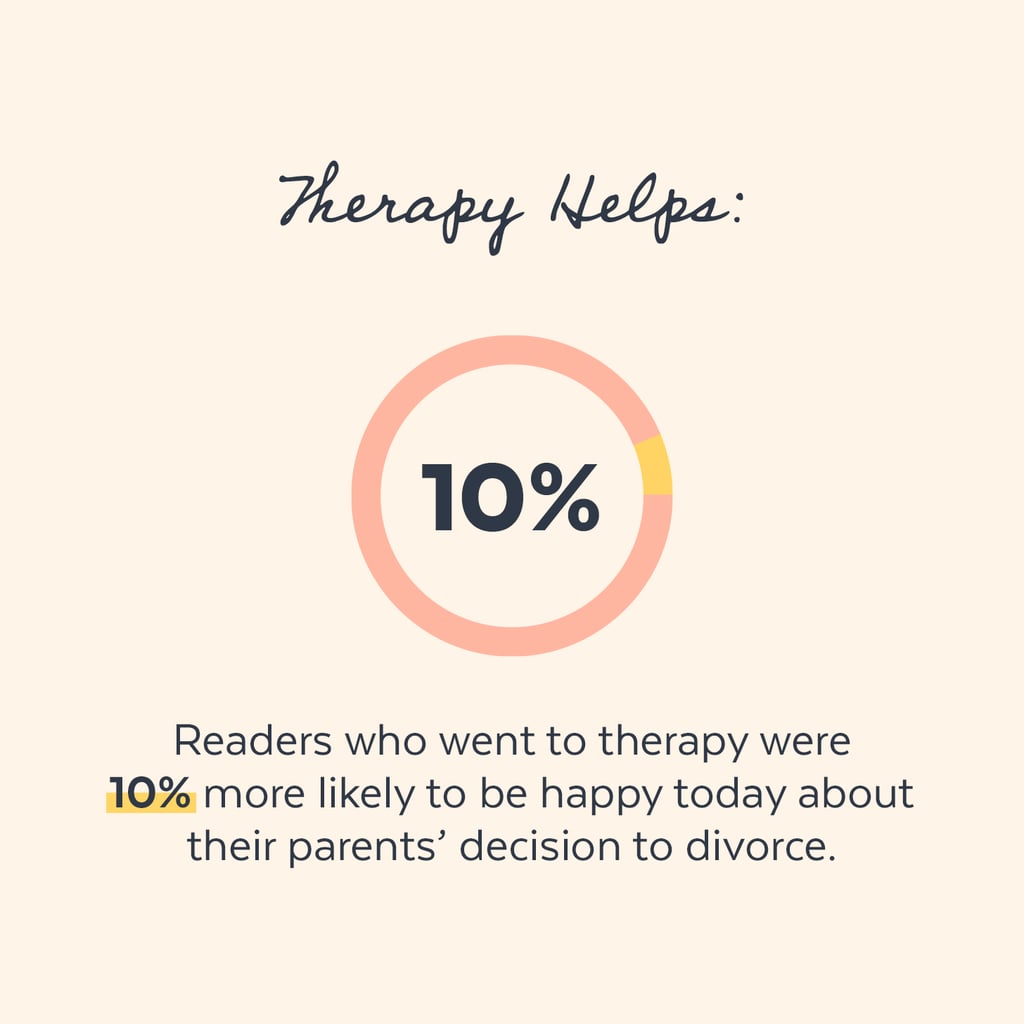
Even in no-drama marriages that simply didn’t work out, divorce can bring up underlying problems, especially if transparent communication was a challenge. Ahrons told me that in these “good enough” marriages, things get swept under the rug and more anger comes out at the time of the divorce. Issues could include disagreements about money, parenting, or how to balance work and home obligations. Ex-couples who may have avoided confronting these differences will be forced to during the divorce, often with more volatile results.
After the high stress and high stakes of major financial and legal decisions resolve, however, the anger will often subside. But rather than pretend everything is OK, parents could be better served allowing their children to attend therapy to talk through their issues. Respondents in our survey who attended therapy were 10 percent more likely to be unhappy their parents got divorced at the time. But they were also 10 percent more likely to be happy today about their parent's decision to divorce. In other words: children of divorce who ended up in therapy may have dealt with a more difficult situation at the time of divorce, but they have ended up more accepting of the breakup.
9. Don’t Try to Change Your Ex
When a patient or client complains about an ex’s behavior, Ahrons finds herself asking these questions a lot: “What was it like in the marriage? How many years did you spend trying to change him? What makes you think you'll be successful now?’”
The key to a happy divorce might be finally accepting your former partner for who they are. As someone who divorced with two kids, Hayes shared this insight: “Try to see the other parent as your children see him.” This helps her from talking negatively about her ex. She even tries to say nice things about her ex-husband in front of her kids when she can.
“Try to see the other parent as your children see him.”
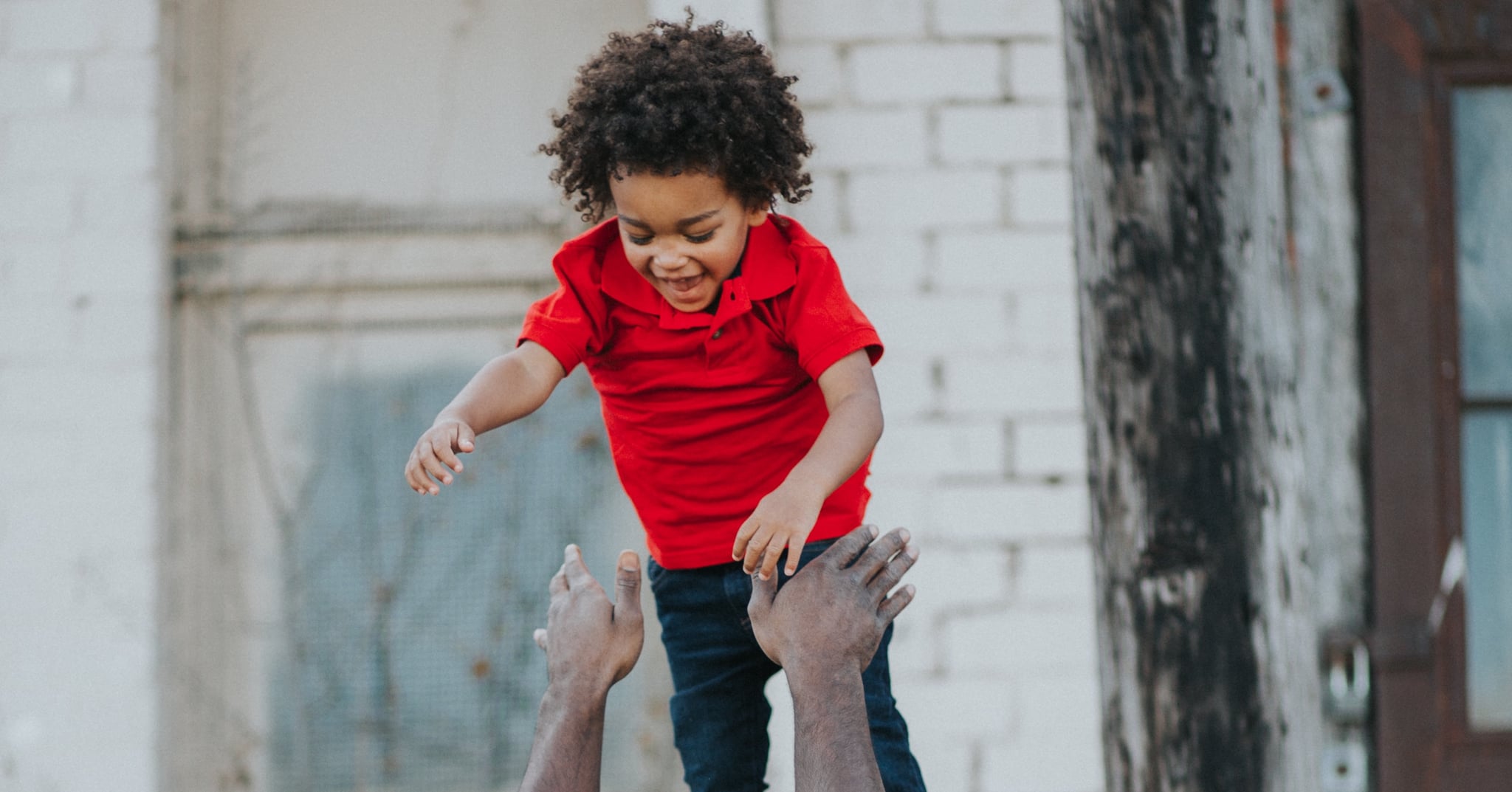
Hayes told me that she learned that life simply isn’t fair and trying to make it fair is a waste of time and energy. “I learned that I can be friends with my ex-husband and create a new definition of love with him,” she explained. While she doesn’t love him in the traditional sense of the word, she said there is a unique bond still between them. “He is the father of my children and we have been through it all together. He has been in my life for 15 years and he will be in my life forever, so I may as well accept it exactly as it is.”
10. Don’t Put Yourself in an Unsafe Situation
Sometimes a happy divorce means creating boundaries. “If you've been a high-conflict couple, you don't want to replicate that after the divorce,” Ahorns told me. She said that in many cases, it’s OK not to prioritize having a relationship with your ex. If your partner has been abusive to you or the children, it’s crucial that you put your safety first.
Adams added that while most people should work with qualified professionals to create an out-of-court settlement, divorce or custody court can be a last resort when one parent is abusive, hiding large sums of money, or refuses to participate in the divorce process.
Turning a Post-Divorce Childhood Into Happier Adulthood
A collaborative divorce process considers the future needs of the binuclear family. It hopes that the children will actually be in a better situation than they were during the marriage, because they no longer are living with two parents who don’t get along. Ultimately, parents want their children to have a happy childhood that will lead to a happy future as adults.
Based on our survey, children of divorce did feel that the experience had an impact on their future relationships: some for the good and some for the bad. Here are few of the responses that took a positive spin:
“I go into my relationships thinking long-term because I do not want to ever get divorced.”
“I was hesitant to trust and knew when I found a partner I wanted to be in it for life.”
“I realized I needed a partner who supported me as much as I support them.”
“I've had a very successful 23-year-plus marriage. I knew I'd never settle.”
“I think it made me know I would not divorce my spouse due to the drama and traumas it caused.”
“It made me very independent and self-sufficient.”
“I am a very strong, independent woman just like my mother.”
“I waited until I was 18 to date and I am married to my first boyfriend. We have four of our own children. I think it made me see that communication is extremely important.”
And some who felt its more negative impact:
“I don't trust men. I'm married, but I often find myself still needing male validation, particularly confirmation that I'm smart or attractive.”
“I think I used romantic relationships to fill something I felt was missing. I idealized relationships. And also I think when things get tough, I want to pack my bags.”
Despite the challenges, it is possible for many divorced parents to create a thriving binuclear family post-divorce. In her article about sitting next to her ex at their kids' soccer games, Hayes admitted that in the first few years following her divorce, it wasn’t so easy to put aside the differences. I asked her if there was any advice she wished she could have given herself. According to Hayes, it would have helped to know the following: “The pain will subside. The stress will lessen. It will, indeed, get easier. You will redefine yourself as a mother and an ex-wife and a woman. Most importantly, the kids will be amazing. They truly are resilient and they will smile and be happy and will adjust to their new lives.”


